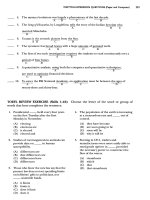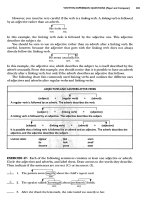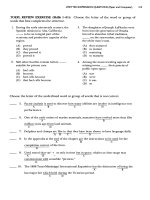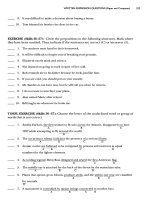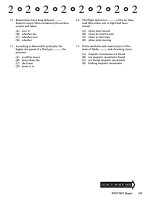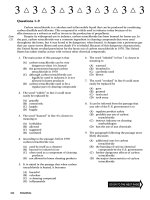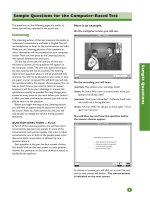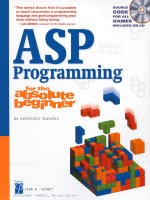Tài liệu Sample Questions for the Computer-Based Test pptx
Bạn đang xem bản rút gọn của tài liệu. Xem và tải ngay bản đầy đủ của tài liệu tại đây (138.58 KB, 8 trang )
1
Sample Questions
Sample Questions
Here is an example.
On the computer screen, you will see:
On the recording, you will hear:
(woman) Hey, where’s your sociology book?
(man) At home. Why carry it around when we’re just
going to be taking a test?
(woman) Don’t you remember? Professor Smith said
we could use it during the test.
(man) Oh, no! Well, I’ve still got an hour, right? I’m so
glad I ran into you!
You will then see and hear the question before
the answer choices appear:
What will the man probably do next?
Begin studying for the sociology test
Explain the problem to his professor
Go home to get his textbook
Borrow the woman’s book
Time
HelpVolume
Confirm
Answer
?
Next
TOEFL - Listening
1 of 600:15
To choose an answer, you will click on an oval. The oval
next to that answer will darken. The correct answer
is indicated on the next screen.
Sample Questions for the Computer-Based Test
The questions on the following pages are similar to
those that will be presented in the actual test.
Listening
The Listening section of the test measures the ability to
understand conversations and talks in English. You will
use headphones to listen to the conversations and talks.
While you are listening, pictures of the speakers or
other information will be presented on your computer
screen. There are two parts to the Listening section,
with special directions for each part.
On the day of the test, the amount of time you
will have to answer all the questions will appear on
the computer screen. The time you spend listening to
the test material will not be counted. The listening
material and questions about it will be presented only
one time. You will not be allowed to take notes or have
any paper at your computer. You will both see and hear
the questions before the answer choices appear. You can
take as much time as you need to select an answer;
however, it will be to your advantage to answer the
questions as quickly as possible. You may change your
answer as many times as you want before you confirm
it. After you have confirmed an answer, you will not be
able to return to the question.
Before you begin working on the Listening section,
you will have an opportunity to adjust the volume of
the sound. After you have started the test, you will
only be able to change the volume during question
directions.
QUESTION DIRECTIONS — Part A
In Part A of the Listening section, you will hear short
conversations between two people. In some of the
conversations, each person speaks only once. In other
conversations, one or both of the people speak more
than once. Each conversation is followed by one
question about it.
Each question in this part has four answer choices.
You should click on the best answer to each question.
Answer the questions on the basis of what is stated or
implied by the speakers.
2
Sample Questions
What will the man probably do next?
Begin studying for the sociology test
Explain the problem to his professor
Go home to get his textbook
Borrow the woman’s book
Time
HelpVol ume
Confirm
Answer
?
Next
TOEFL - Listening
00:14 1 of 6
After you click on Next and Confirm Answer, the
next conversation will be presented.
QUESTION DIRECTIONS — Part B
In Part B of the Listening section, you will hear several
longer conversations and talks. Each conversation or
talk is followed by several questions. The conversations,
talks, and questions will not be repeated.
The conversations and talks are about a variety
of topics. You do not need special knowledge of the
topics to answer the questions correctly. Rather, you
should answer each question on the basis of what is
stated or implied by the speakers in the conversations
or talks.
For most of the questions, you will need to click on
the best of four possible answers. Some questions will
have special directions. The special directions will
appear in a box on the computer screen.
Here is an example of a conversation and
some questions:
Time
HelpVolume
Confirm
Answer
?
Next
TOEFL - Listening
Marine Biology
(narrator) Listen to part of a discussion in a marine
biology class.
(professor) A few years ago, our local government
passed a number of strict environmental laws. As a
result, Sunrise Beach looks nothing like it did ten
years ago. The water is cleaner, and there’s been a
tremendous increase in all kinds of marine life —
which is why we’re going there on Thursday.
(woman) I don’t know if I agree that the water quality
has improved. I mean, I was out there last weekend,
and it looked all brown. It didn’t seem too clean
to me.
(professor) Actually, the color of the water doesn’t
always indicate whether it’s polluted. The brown
color you mentioned might be a result of pollution,
or it can mean a kind of brown algae is growing
there. It’s called “devil’s apron,” and it actually
serves as food for whales.
(man) So when does the water look blue?
(professor) Well, water that’s completely unpolluted
is actually colorless. But it often looks bluish-green
because the sunlight can penetrate deep down and
that’s the color that’s reflected.
(woman) But sometimes it looks really green. What’s
that about?
(professor) OK, well, it’s the same principle as with
“devil’s apron”: the water might look green because
of different types of green algae there — gulfweed,
phytoplankton. You all should finish reading about
algae and plankton before we go. In fact, those are
the types of living things I’m going to ask you to be
looking for when we’re there.
3
Sample Questions
Sample Questions
After the conversation, you will read:
Answer
Time
HelpVo lume
Confirm
?
Next
TOEFL - Listening
Now get ready to answer
the questions.
Confirm
Answer
Then, the first question will be presented:
Time
HelpVolume
Confirm
Answer
?
Next
TOEFL - Listening
What is the discussion mainly about?
The importance of protecting ocean environments
The reasons why ocean water appears to be different
colors
The survival of whales in polluted water
The effect that colored ocean water has on algae
00:14 2 of 6
To choose an answer, you will click on an oval. The oval
next to that answer will darken. The correct answer is
indicated on the screen below.
Time
HelpVolu me
Confirm
Answer
?
Next
TOEFL - Listening
What is the discussion mainly about?
The importance of protecting ocean environments
The reasons why ocean water appears to be different
colors
The survival of whales in polluted water
The effect that colored ocean water has on algae
00:13 2 of 6
After you click on Next and Confirm Answer,
the next question will be presented:
Time
HelpVolu me
Confirm
Answer
?
Next
TOEFL - Listening
According to the professor, what can make ocean water
look brown?
Pollution
Cloudy Skies
Sand
Algae
Click on 2 answers.
00:13 3 of 6
To choose your answers, you will click on the squares.
An “X” will appear in each square. The correct answers
are indicated on the screen below.
Time
HelpVol ume
Confirm
Answer
?
Next
TOEFL - Listening
According to the professor, what can make ocean water
look brown?
Pollution
Cloudy Skies
Sand
Algae
Click on 2 answers.
00:12
3 of 6
4
Sample Questions
Structure
This section measures the ability to recognize language
that is appropriate for standard written English. There
are two types of questions in this section.
In the first type of question, there are incomplete
sentences. Beneath each sentence are four words or
phrases. You will choose the one word or phrase that
best completes the sentence.
Here is an example:
Directions: Click on the one word or phrase that best completes the sentence.
The columbine flower, to nearly
all of the United States, can be raised from
seed in almost any garden.
native
how native is
how native is it
is native
Time
Help
Confirm
Answer
?
Next
TOEFL - Structure
00:15
1 of 2
Clicking on a choice darkens the oval. The correct
answer will be indicated on the screen.
The second type of question has four underlined
words or phrases. You will choose the one underlined
word or phrase that must be changed for the sentence
to be correct.
Here is an example:
Directions: Click on the one underlined word or phrase that must be changed
for the sentence to be correct.
One of the most difficult problems in understanding
sleep is determining what the functions of sleep is.
Time
Help
Confirm
Answer
?
Next
TOEFL - Structure
00:14 2 of 2
Clicking on an underlined word or phrase will darken it.
The correct answer is indicated on the screen below.
Directions: Click on the one underlined word or phrase that must be changed
for the sentence to be correct.
Time
Help
Confirm
Answer
?
Next
TOEFL - Structure
One of the most difficult problems in understanding
sleep is determining what the functions of sleep is.
00:13 2 of 2
The sentence should read: “One of the most difficult
problems in understanding sleep is determining what
the functions of sleep are.” After you click on Next and
Confirm Answer, the next question will be presented.
Reading
This section measures the ability to read and under-
stand short passages similar in topic and style to those
that students are likely to encounter in North American
universities and colleges. This section contains reading
passages and questions about the passages. There are
several different types of questions in this section.
In the Reading section, you will first have the oppor-
tunity to read the passage.
Time
Help
Prev
?
Next
TOEFL - Reading Comprehension Text
Beginning
When
finished
reading the
passage
click on the
icon below
Proceed
The temperature of the Sun is over 10,000
degrees Fahrenheit at the surface, but it rises to
perhaps more than 27,000,000° at the center the Sun
is so much hotter than the Earth that matter can exist
only as a gas, except perhaps at the core. In the core
of the sun, the pressures are so great that, despite
the high temperature, there may be a small solid core.
However, no one really knows, since the center of the
Sun can never be directly observed.
Solar astronomers do know that the Sun is
divided into five general layers or zones. starting at
the outside and going down into the sun, the zones are
the corona, chromosphere, photosphere, convection
zone, and finally the core. The first three zones are r
regarded as the Sun’s atmosphere. But since the
Sun has no silid surface, it is hard to tell where the
atmosphere ends and the main body of the Sun
begins.
The Sun’s outermost layer begins about 10,000
miles above the visible surface and goes outward for
millions of miles. this is the only part of the Sun that
can be seen during an eclipse such as the one in
February 1979. At any other time, the corona can
be seen only when special instruments are used on
Time
Help
Prev
?
Next
TOEFL - Reading Comprehension Text
Beginning
The temperature of the Sun is over 10,000
degrees Fahrenheit at the surface, but it rises to
perhaps more than 27,000,000° at the center. The Sun
is so much hotter than the Earth that matter can exist
only as a gas, except perhaps at the core. In the core
of the Sun, the pressures are so great that, despite
the high temperature, there may be a small solid core.
However, no one really knows, since the center of the
Sun can never be directly observed.
Solar astronomers do know that the Sun is
divided into five general layers or zones. Starting at
the outside and going down into the Sun, the zones are
the corona, chromosphere, photosphere, convection
zone, and finally the core. The first three zones are
regarded as the Sun’s atmosphere. But since the
Sun has no solid surface, it is hard to tell where the
atmosphere ends and the main body of the Sun
begins.
The Sun’s outermost layer begins about 10,000
miles above the visible surface and goes outward for
millions of miles. This is the only part of the Sun that
can be seen during an eclipse such as the one in
February 1979. At any other time, the corona can
be seen only when special instruments are used on
When
finished
reading the
passage
click on the
icon below
Proceed
01:10
5
Sample Questions
Sample Questions
You will use the scroll bar to view the rest of
the passage.
Time
Help
Prev
?
Next
TOEFL - Reading Comprehension Text
End
When
finished
reading the
passage
click on the
icon below
Proceed
atmosphere ends and the main body of the Sun
begins.
The Sun’s outermost layer begins about 10,000
miles above the visible surface and goes outward for
millions of miles. This is the only part of the Sun that
can be seen during an eclipse such as the one in
February 1979. At any other time, the corona can
be seen only when special instruments are used on
cameras and telescopes to block the light from the
photosphere.
The corona is a brilliant, pearly white, filmy light,
about as bright as the full Moon. Its beautiful rays
are a sensational sight during an eclipse. The
corona’s rays flash out in a brilliant fan that has wispy
spikelike rays near the Sun’s north and south poles.
The corona is generally thickest at the Sun’s equator.
The corona is made up of gases streaming
outward at tremendous speeds that reach a
temperature of more than 2 million degrees
Fahrenheit. The gas thins out as it reaches the
space around the planets. By the time the gas of
the corona reaches the Earth it has a relatively low
density.
01:06
When you have finished reading the passage, you will
use the mouse to click on Proceed. Then the questions
about the passage will be presented. You are to choose
the one best answer to each question. Answer all
questions about the information in a passage on the
basis of what is stated or implied in that passage.
Most of the questions will be multiple choice. To
answer a question you will click on a choice below the
question.
Here is an example:
Time
Help
Prev
?
Next
TOEFL - Reading Comprehension Text
Beginning
When
finished
reading the
passage
click on the
icon below
Proceed
The temperature of the Sun is over 10,000
degrees Fahrenheit at the surface, but it rises to
perhaps more than 27,000,000° at the center the Sun
is so much hotter than the Earth that matter can exist
only as a gas, except perhaps at the core. In the core
of the sun, the pressures are so great that, despite
the high temperature, there may be a small solid core.
However, no one really knows, since thecenter of the
Sun can never be directly observed.
Solar astronomers do know that the Sun is
divided into five general layers or zones. starting at
the outside and going down into the sun, the zones are
the corona, chromosphere, photosphere, convection
zone, and finally the core. The first three zones are r
regarded as the Sun’s atmosphere. But since the
Sun has no silid surface, it is hard to tell where the
atmosphere ends and the main body of the Sun
begins.
The Sun’s outermost layer begins about 10,000
miles above the visible surface and goes outward for
millions of miles. this is the only part of the Sun that
can be seen during an eclipse such as the one in
February 1979. At any other time, the corona can
be seen only when special instruments are used on
Time
Help
Prev
?
Next
TOEFL - Reading Comprehension 1 of 4
More AvailableQuestions 1 to 4
However, no one really knows, since the center of the
Sun can never be directly observed.
Solar astronomers do know that the Sun is
divided into five general layers or zones. Starting at
the outside and going down into the sun, the zones are
the corona, chromosphere, photosphere, convection
zone, and finally the core. The first three zones are
regarded as the Sun’s atmosphere. But since the
Sun has no solid surface, it is hard to tell where the
atmosphere ends and the main body of the Sun
begins.
The Sun’s outermost layer begins about 10,000
miles above the visible surface and goes outward for
millions of miles. This is the only part of the Sun that
can be seen during an eclipse such as the one in
February 1979. At any other time, the corona can
be seen only when special instruments are used on
cameras and telescopes to block the light from the
photosphere.
The corona is a brilliant, pearly white, filmy light,
about as bright as the full Moon. Its beautiful rays
are a sensational sight during an eclipse. The
corona’s rays flash out in a brilliant fan that has wispy
spikelike rays near the Sun’s north and south poles.
With what topic is paragraph 2 mainly
concerned?
How the Sun evolved
The structure of the Sun
Why scientists study the Sun
The distance of the Sun from the
planets
Paragraph 2 is marked with an arrow
[ ].
➞
➞
01:03
When you click on a choice, the oval will darken to
show which answer you have chosen. To choose a
different answer, click on a different oval. You will see
the next question after you click on Next.
To answer some questions you will click on a word
or phrase.
Here is an example:
Time
Help
Prev
?
Next
TOEFL - Reading Comprehension Text
Beginning
Time
Help
Prev
?
Next
TOEFL - Reading Comprehension 2 of 4
More Available
Questions 1 to 4
Solar astronomers do know that the Sun is
divided into five general layers or zones. Starting at
the outside and going down into the sun, the zones are
the corona, chromosphere, photosphere, convection
zone, and finally the core. The first three zones are
regarded as the Sun’s atmosphere. But since the
Sun has no solid surface, it is hard to tell where the
atmosphere ends and the main body of the Sun
begins.
The Sun’s outermost layer begins about
10,000 miles above the visible surface and
goes outward for millions of miles. This is the
only part of the Sun that can be seen during an
eclipse such as the one in February 1979. At
any other time, the corona can be seen only when
special instruments are used on cameras and
telescopes to block the light from the photosphere.
The corona is a brilliant, pearly white, filmy light,
about as bright as the full Moon. Its beautiful rays
are a sensational sight during an eclipse. The
corona’s rays flash out in a brilliant fan that has wispy
spikelike rays near the Sun’s north and south poles.
The corona is generally thickest at the Sun’s equator.
The corona is made up of gases streaming
Look at the word one in the
passage. Click on the word or
phrase in the bold text that one
refers to.
01:02
To answer, you can click on any part of the word or
phrase in the passage. Your choice will darken to show
which word you have chosen. The correct answer is
indicated on the screen below.
Time
Help
Prev
?
Next
TOEFL - Reading Comprehension Text
Beginning
When
finished
reading the
passage
click on the
icon below
Proceed
Time
Help
Prev
?
Next
TOEFL - Reading Comprehension 2 of 4
More AvailableQuestions 1 to 4
Solar astronomers do know that the Sun is
divided into five general layers or zones. Starting at
the outside and going down into the sun, the zones are
the corona, chromosphere, photosphere, convection
zone, and finally the core. The first three zones are
regarded as the Sun’s atmosphere. But since the
Sun has no solid surface, it is hard to tell where the
atmosphere ends and the main body of the Sun
begins.
The Sun’s outermost layer begins about
10,000 miles above the visible surface and
goes outward for millions of miles. This is the
only part of the Sun that can be seen during an
eclipse such as the one in February 1979. At
any other time, the corona can be seen only when
special instruments are used on cameras and
telescopes to block the light from the photosphere.
The corona is a brilliant, pearly white, filmy light,
about as bright as the full Moon. Its beautiful rays
are a sensational sight during an eclipse. The
corona’s rays flash out in a brilliant fan that has wispy
spikelike rays near the Sun’s north and south poles.
The corona is generally thickest at the Sun’s equator.
The corona is made up of gases streaming
Look at the word one in the
passage. Click on the word or
phrase in the bold text that one
refers to.
01:01
You will see the next question after you click on
Next.
6
Sample Questions
To answer some questions you will click on a square
to add a sentence to the passage.
Here is an example:
Time
Help
Prev
?
Next
TOEFL - Reading Comprehension Text
Beginning
When
finished
reading the
passage
click on the
icon below
Proceed
Time
Help
Prev
?
Next
TOEFL - Reading Comprehension 4 of 4
More AvailableQuestions 1 to 4
The following sentence can be added
to paragraph 1.
At the center of the Earth’s
solar system lies the Sun.
Where would it best fit in
paragraph 1? Click on the square
[ ■ ] to add the sentence to the
paragraph.
Paragraph 1 is marked with an arrow
[ ].
➞
➞
■ The temperature of the Sun is over 10,000
degrees Fahrenheit at the surface, but it rises to
perhaps more than 27,000,000° at the center. ■ The
Sun is so much hotter than the Earth that matter can
exist only as a gas, except perhaps at the core. In the
core of the Sun, the pressures are so great that,
despite the high temperature, there may be a small
solid core. ■ However, no one really knows, since the
center of the Sun can never be directly observed. ■
Solar astronomers do know that the Sun is
divided into five general layers or zones. Starting at
the outside and going down into the sun, the zones are
the corona, chromosphere, photosphere, convection
zone, and finally the core. The first three zones are
regarded as the Sun’s atmosphere. But since the
Sun has no solid surface, it is hard to tell where the
atmosphere ends and the main body of the Sun
begins.
The Sun’s outermost layer begins about 10,000
miles above the visible surface and goes outward for
millions of miles. This is the only part of the Sun that
can be seen during an eclipse such as the one in
February 1979. At any other time, the corona can
be seen only when special instruments are used on
01:00
When you click on a square, the sentence will appear
in the passage at the place you have chosen. You can
read the sentence added to the paragraph to see if this
is the best place to add it. You can click on another
square to change your answer.
The sentence will be added and shown in a
dark box. The correct answer is indicated on the
screen below.
Time
Help
Prev
?
Next
TOEFL - Reading Comprehension Text
Beginning
When
finished
reading the
passage
click on the
icon below
Proceed
Time
Help
Prev
?
Next
TOEFL - Reading Comprehension 4 of 4
More AvailableQuestions 1 to 4
The following sentence can be added
to paragraph 1.
At the center of the Earth’s
solar system lies the Sun.
Where would it best fit in
paragraph 1? Click on the square
[ ■ ] to add the sentence to the
paragraph.
Paragraph 1 is marked with an arrow
[ ].
➞
➞
At the center of the Earth’s solar system
lies the Sun. The temperature of the Sun is over
10,000 degrees Fahrenheit at the surface, but it rises
to perhaps more than 27,000,000° at the center. ■ The
Sun is so much hotter than the Earth that matter can
exist only as a gas, except perhaps at the core. In the
core of the Sun, the pressures are so great that,
despite the high temperature, there may be a small
solid core. ■ However, no one really knows, since the
center of the Sun can never be directly observed. ■
Solar astronomers do know that the Sun is
divided into five general layers or zones. Starting at
the outside and going down into the sun, the zones are
the corona, chromosphere, photosphere, convection
zone, and finally the core. The first three zones are
regarded as the Sun’s atmosphere. But since the
Sun has no solid surface, it is hard to tell where the
atmosphere ends and the main body of the Sun
begins.
The Sun’s outermost layer begins about 10,000
miles above the visible surface and goes outward for
millions of miles. This is the only part of the Sun that
can be seen during an eclipse such as the one in
February 1979. At any other time, the corona can
00:59
Writing
In this section, you will have an opportunity to demon-
strate your ability to write in English. This includes the
ability to generate and organize ideas, to support those
ideas with examples or evidence, and to compose in
standard written English a response to an assigned
topic.
On the day of the test, an essay topic will be given to
you. You will have 30 minutes to write your essay
on that topic. You must write on the topic you are
assigned. An essay on any other topic will receive a
score of “0.” Before the topic is presented, you must
choose whether to type your essay on the computer
or to handwrite your essay on the paper essay answer
sheet provided.
You will be given scratch paper for making notes.
However, only your response handwritten on the single
page, two-sided essay answer sheet or typed in the
essay box on the computer will be scored.
The essay topic will be presented to you on the
computer screen. You will be given one essay topic. You
do not have a choice of essay topics. The essay screen
will be similar to this:
10.0
Cut
Paste
Undo
Do you agree or disagree with the following statement?
Teachers should make learning enjoyable and fun for their students.
Use specific reasons and examples to support your opinion.
Read the topic below and then make any notes that will help you plan your response.
Begin typing your response in the box at the bottom of the screen, or write your answer
on the answer sheet provided to you.
Time
Help
Confirm
Answer
?
Next
00:30 1 of 1TOEFL - Writing
You can click on Next and Confirm Answer to
end the Writing section at any time. At the end of
30 minutes, the computer will automatically end
the section.
DO NOT click on Next and Confirm Answer
until you have finished typing or writing your essay.
NOTE: Some of the possible writing topics are printed
on pages 12-14. You may find it helpful to use these
topics to practice.
7
Sample Questions
Sample Questions for the Paper-Based Test
Section 1 — Listening Comprehension
In this section of the test, you will have an opportunity to demonstrate
your ability to understand conversations and talks in English. There are
three parts to this section, with special directions for each part. Answer
all the questions on the basis of what is stated or implied by the speakers
you hear. Do not take notes or write in your test book at any time. Do
not turn the pages until you are told to do so.
Directions: In Parts A and B, you will hear conversations between two
people. After each conversation, you will hear a question about the
conversation. The conversations and questions will not be repeated.
After you hear a question, you will read the four possible answers in
your test book and choose the best answer. Then, on your answer sheet,
find the number of the question and fill in the space that corresponds to
the letter of the answer you have chosen.
Here is an example. Sample Answer
On the recording, you will hear:
A B C D
(woman) I don’t like this
painting very much.
(man) Neither do I.
(narrator) What does the man mean?
In your test book, you will read:
(A) He doesn’t like the painting either.
(B) He doesn’t know how to paint.
(C) He doesn’t have any paintings.
(D) He doesn’t know what to do.
You learn from the conversation that neither the man nor the woman
likes the painting. The best answer to the question, ‘‘What does the man
mean?” is (A), ‘‘He doesn’t like the painting either.’’ Therefore, the
correct choice is (A).
Directions: In Part C of this section you will hear several talks. After
each talk, you will hear some questions. The talks and questions will not
be repeated.
After you hear a question, you will read the four possible answers in
your test book and choose the best answer. Then, on your answer sheet,
find the number of the question and fill in the space that corresponds to
the letter of the answer you have chosen.
Here is an example.
On the recording, you will hear:
(narrator) Listen to an instructor talk to his class about a
television program.
(man) I’d like to tell you about an interesting TV program
that’ll be shown this coming Thursday. It’ll be on
from 9 to 10 pm on Channel 4. It’s part of a series
called “Mysteries of Human Biology.” The subject
of the program is the human brain — how it
functions and how it can malfunction. Topics that
will be covered are dreams, memory, and
depression. These topics are illustrated with
outstanding computer animation that makes the
explanations easy to follow. Make an effort to see
this show. Since we’ve been studying the nervous
system in class, I know you’ll find it very helpful.
Sample Question Sample Answer
You will hear:
A B C D
(narrator) What is the main purpose
of the program?
In your test book, you will read:
(A) To demonstrate the latest use of computer
graphics.
(B) To discuss the possibility of an economic
depression.
(C) To explain the workings of the brain.
(D) To dramatize a famous mystery story.
The best answer to the question, “What is the main purpose of the
program?’’ is (C), ‘‘To explain the workings of the brain.’’ Therefore, the
correct choice is (C).
Sample Question Sample Answer
You will hear:
A B C D
(narrator) Why does the speaker
recommend watching the program?
In your test book, you will read:
(A) It is required of all science majors.
(B) It will never be shown again.
(C) It can help viewers improve their memory
skills.
(D) It will help with course work.
The best answer to the question, ‘‘Why does the speaker recommend
watching the program?’’ is (D), ‘‘It will help with course work.’’
Therefore, the correct choice is (D).
Remember, you are not allowed to take notes or write in your test
book.
Section 2 —
Structure and Written Expression
This section is designed to measure your ability to recognize language
that is appropriate for standard written English. There are two types
of questions in this section, with special directions for
each type.
Structure
Directions: These questions are incomplete sentences. Beneath each
sentence you will see four words or phrases, marked (A), (B), (C), and
(D). Choose the one word or phrase that best completes the sentence.
Then, on your answer sheet, find the number of the question and fill in
the space that corresponds to the letter of the answer you have chosen.
Look at the following examples:
Example I Sample Answer
Geysers have often been compared to volcanoes
A B C D
_ _ _ _ _ they both emit hot liquids from below
the Earth’s surface.
(A) due to
(B) because
(C) in spite of
(D) regardless of
The sentence should read, “Geysers have often been compared to
volcanoes because they both emit hot liquids from below the Earth’s
surface.” Therefore, you should choose answer (B).
8
Sample Questions
Example II Sample Answer
During the early period of ocean navigation,
A B C D
_ _ _ _ _ any need for sophisticated instruments
and techniques.
(A) so that hardly
(B) where there hardly was
(C) hardly was
(D) there was hardly
The sentence should read, “During the early period of ocean navigation,
there was hardly any need for sophisticated instruments and techniques.”
Therefore, you should choose answer (D).
Written Expression
Directions: In these questions, each sentence has four underlined
words or phrases. The four underlined parts of the sentence are marked
(A), (B), (C), and (D). Identify the one underlined word or phrase that
must be changed in order for the sentence to be correct. Then, on your
answer sheet, find the number of the question and fill in the space that
corresponds to the letter of the answer you have chosen.
Look at the following examples:
Example I Sample Answer
Guppies are sometimes call rainbow fish because
A B C D
ABC
of the males’ bright colors.
D
The sentence should read, “Guppies are sometimes called rainbow fish
because of the males’ bright colors.” Therefore, you should choose
answer (A).
Example II Sample Answer
Serving several term in Congress, Shirley
A B C D
AB
Chisholm became an important United States
C
politician.
D
The sentence should read, “Serving several terms in Congress, Shirley
Chisholm became an important United States politician.” Therefore,
you should choose answer (B).
Section 3 — Reading Comprehension
This section is designed to measure your ability to read and understand
short passages similar in topic and style to those that students are likely
to encounter in North American universities and colleges. This section
contains reading passages and questions about the passages.
Directions: In this section you will read several passages. Each one is
followed by a number of questions about it. You are to choose the one
best answer, (A), (B), (C), or (D), to each question. Then, on your
answer sheet, find the number of the question and fill in the space that
corresponds to the letter of the answer you have chosen.
Answer all questions about the information in a passage on the basis
of what is stated or implied in that passage.
Read the following passage:
The railroad was not the first institution to impose regularity on
society, or to draw attention to the importance of precise
timekeeping. For as long as merchants have set out their wares at
daybreak and communal festivities have been celebrated, people
have been in rough agreement with their neighbors as to the time of
day. The value of this tradition is today more apparent than ever.
Were it not for public acceptance of a single yardstick of time,
social life would be unbearably chaotic: the massive daily transfers
of goods, services, and information would proceed in fits and
starts; the very fabric of modern society would begin to unravel.
Example I Sample Answer
What is the main idea of the passage?
A B C D
(A) In modern society we must make more
time for our neighbors.
(B) The traditions of society are timeless.
(C) An accepted way of measuring time is
essential for the smooth functioning of
society.
(D) Society judges people by the times at
which they conduct certain activities.
The main idea of the passage is that societies need to agree about how
time is to be measured in order to function smoothly. Therefore, you
should choose answer (C).
Example II Sample Answer
In line 6, the phrase ‘‘this tradition’’ refers to
A B C D
(A) the practice of starting the business day
at dawn
(B) friendly relations between neighbors
(C) the railroad’s reliance on time schedules
(D) people’s agreement on the measurement
of time
The phrase ‘‘this tradition’’ refers to the preceding clause, ‘‘people have
been in rough agreement with their neighbors as to the time of day.’’
Therefore, you should choose answer (D).
Line
(5)
(10)
